- Home
- Tim Winton
The Riders Page 4
The Riders Read online
Page 4
‘Whose idea was it?’
‘Hers, I spose.’
‘And you followed.’
‘I was game for a change, yeah. I didn’t exactly follow.’
‘Used to be the women who followed.’
Scully laughed, but it stung somehow. Admit it, Scully, he thought. You followed, you’d follow her anywhere. A few weeks ago you couldn’t sleep for dreams of home, of hot white beaches and the wicked scent of coconut oil and the Fremantle Doctor blowing the curtains inward against the long table there in that house you sweated on all those years. You were a mad dog for it, mate, like a horse in the home paddock, bolting with your nose in the air, kissing Europe goodbye, letting it kiss your cakehole for all you cared, and then wham! you turned on a penny for her sake. On a queer feeling, a thing she couldn’t explain, just to see her happy.
‘Well, maybe it’s our turn to follow anyway,’ he said.
‘Mebbe so. I don’t know about women. These boards need sandin now. You need the power on, Scully. You can’t do all this by hand.’
‘It’s the money, mate. I’m stuffed until the money comes through from home. I’m living on the change from my air ticket. I don’t know if I can even pay what I owe you already.’
‘What, you think I’m lyin awake at night waitin for to be paid? What a proddy you are. I’ll have Con come by in the mornin and put a box in, I shoulda thought of it Monday. I’ll be frigged if I’m comin by to do this shite by hand. And yev got holes in your chimney there, go make some mortar. Make it one part Portland, one of lime and six of good sand. If he don’t show by eleven tomorrow, you must go in and get him. It’s the Conor Keneally Electric in Birr. He’ll be the poor big bastard looks like me.’
Eight
BUT CONOR KENEALLY DIDN’T COME, not for days he didn’t, and Scully thought it best to wait it out. He scraped mildew and dirt and pulpy mortar from the interior walls and caulked up holes and cracks, and then rendered the whole surface anew, filling the place with the heady stink of lime. He scraped paint from the low attic ceiling of the upstairs rooms and sugar-soaped it till his hands were raw. The house filled with shavings and sawdust and paint flakes and wall scum and began to look like the galley of a prawn trawler. Scully found himself squatting by the hearth at night, eating with his hands. In his sliver of mirror he looked feral. He worked on without electricity, driving himself, sleeping only on his oak door amid the drifts and draughts. He just couldn’t bring himself to go into Birr and chase Conor Keneally up, not when the man’s brother came by every day with a pair of cover-alls over his postal uniform and a trowel in his hand and a pint of Power’s at the ready. The man came by with a gas bottle, for pity’s sake, and a kitchen sink and beds brought piece by piece atop the mail of the Republic. The two of them would stand about at day’s end silently observing the lack of electricity.
‘You should get out now and then, Scully,’ Pete-the-Post said. ‘You’re killin yeself here and meetin no one, not even your neighbours.’
‘You keep bringing me my food. I can never think of an excuse to go in. You second guess me.’
‘Well, I’m takin pity on ye, Scully.’
This caused Scully to laugh uncomfortably. Did he seem that pitiable? True, he was living rough, but it was a temporary thing.
‘I’m getting there.’
‘That you are, son. You work like a nigger.’
Scully winced but let it pass.
‘I just wish you’d bill me.’
‘Are you lookin for a job?’
‘Come New Year I will be, yeah.’
‘Well, when you get your job you’ll get your bills.’
Scully didn’t go looking for Conor Keneally out of respect. After a man said things like that, how could you go embarrassing him by pursuing his brother the way Scully felt like pursuing him, morning after morning when he failed to show? Scully’s power tools lay downstairs in an ugly row and daily he went at things by hand, by candlelight, by firelight, funnelling his anxiety into work.
In two mad days Scully painted out the whole interior in lime wash, and the place suddenly seemed brighter, bigger, cleaner, and so strangely wholesome that it made him realize how foul it had been before, what scunge he’d really been dealing with day and night. Then he sealed the timber floor upstairs and buffed it by hand, and he lacquered the oak banister of the stair and the great beams that ran from lintel to lintel downstairs. From pine boards in the barn loft he made a cabinet for the kitchen sink that lacked only its ply cladding and the hinges for its doors. He shaved down spare boards for bookshelves and set them upstairs beside Billie’s bed, and so pretty were they that he began to wonder whether electricity might spoil this life after all. Peter arrived with salvage ply and a box of panel pins and he finished the kitchen. The flags were dry and swept. It was a clean, simple place, his new house, a place he was glad to wake in now, but it was still without music, without voices and laughter for most of the day.
There were moments in Scully’s day when he simply could not use a brush or plane or hammer for the thought of the summer he was about to miss at home: the colourless grass prostrate before the wind, the flat sea whitehot at its edge and the boats paralysed at their moorings with the heat and the smell of the desert descending upon them in the marinas and coves and riverbends. The great glossy weight of grapes hanging overhead and the smell of snapper grilling over charcoal. The seamless blue sky and the loose clothing on brown bodies. Lord, it gave him bad pangs, the thought of leaving all that behind, the idea of Jennifer and Billie packing that life into tea-chests and walking out of their old Fremantle house. Maybe they should have gone halfway on this, taken out a loan in case things didn’t work out. The Fremantle house was worth ten times what they’d paid for this. They needn’t have sold really. But then he thought of that dreamy, sweet look of happiness on her face that day last month, that look of resolution which made her seem unreservedly confident for the first time in years. It was worth following, it had to be worth the risk of trust.
Worse than the pangs of doubt and fear he felt alone at work, Scully had waking dreams of her here. They were so vivid he could feel her breath on him. He saw linen on his bed and the two of them glistening, gasping in the quiet, her black hair a shadow upon the sheet. Billie’s sleeping form beside the gable window with the tarry sky behind her, and a cradle in the corner still swinging faintly in the clear, clear air.
Scully showered under the spray of a hose in the door arch of the barn at night, and so cold was the water that from out in the fields and down in the woods you could hear him bellow like a man truly suffering.
• • •
CONOR KENEALLY DIDN’T COME and didn’t come, and one afternoon when Scully couldn’t bear to be at it any longer, he threw down his tools and went out walking. The sky was low. The wind blew hard from the hills. He shoved his fists deep in his pockets and stumped between hawthorn hedges and fallen walls down the lanes into the valley. He heard a tractor slinging shed slurry onto a field somewhere and dogs barking. The smell of burning peat hung in the air. He skirted the castle and its farm and went on deep into the valley where the fields were dark and heavy and became bogs at the foot of the hills. A small church stood alone on the bend in the lane. Scully climbed the stile into the graveyard and walked among the granite tombs beneath the Celtic crosses and fossilized flowers. He loved those crosses with their topography of faces and plants and stories, so much more potent than the bare symbols of his Salvation Army upbringing. There was suffering there, life lived, and beauty. He touched their lichened veins and practised crossing himself a moment before walking on sheepishly.
In a quiet wood beyond he saw pheasants and a few fleeing rabbits. His own footprints were sinister in the leaf litter and his breath spouted out before him. The valley reminded him of the dairy farm of his childhood with its standing puddles and makeshift gates and diesel murmurs somewhere on the air. The buildings were stone here and had outlived whole family lines, pre-dated nations
and accents and understandings, while the sheds and houses of Scully’s childhood were all hewn from the forest around them, their flapping tin and sunsilvered wood ancient before their time. That was the life the banks had taken from his father. The suits came swooping and the farm slipped away. Scully only had the memory, the stirring now and then of that life before chest hair and girls and shopping malls. Maybe that’s why I’m here, he thought, surprised. Maybe I’m buying back the farm in a way, buying back childhood. He thought of his broken father living out an adaptation in the suburbs, his mother dazedly behind him. The quick decline. The strokes. The suits alighting once again. Buying the farm, what a good way to describe oblivion.
Looking back he saw his tiny faded white house up on the hill against the sky. Between him and it were the sodden fields rising up to the huge bald oak before the shell of the castle and its outbuildings with all their black staring windows. He imagined six hundred years of peasants looking up from their work to see the severe Norman outline of that sentry at the head of the valley. It had as many eyes as God, that shadow up there. Little wonder they burnt it.
Scully stumped across the miry fields feeling the wind bright on his cheeks.
As he approached a stone wall looking for a stile, Scully heard dogs. He stopped and cocked his head and almost went backwards into the slurry as two rangy hounds came silently across the wall and over his head.
‘Good day to ye!’ yelled a farmer with one leg over and the butt of his broken shotgun following.
‘G’day,’ said Scully with the dogs about his legs.
The farmer eased down the wall to land steady on his feet in the mud. He was dressed for hunting.
‘My name’s Scully. We’re neighbours now, I spose.’
‘Ah, you’re the Australian boy from Binchy’s Bothy, then.’
‘That’s me. Pleased to meet you.’
Scully shook his little spotted hand. He was gaunt and gingery with crazy fat sideburns and bad teeth, and Scully liked the look of him.
‘Jimmy Brereton, man of leisure. I don’t mind tellin ye the first time I saw them candles in the window up there last week I nearly shit meself. I thought, it was auld Binchy back again, the lazy booger.’
‘No, it’s just me.’
‘And the family comin, they tell me.’
‘You been talking to Pete-the-Post.’
‘Aw, Jaysus no,’ the man laughed. ‘Peter’s been talkin to me!’
‘He’s a good bloke.’
‘Ah, he’s great gas is Peter. Follow Pete, they say, for wherever Pete is the crack is mighty.’
Scully laughed. ‘Well they’re right.’
‘He says you’re doin a fine job of it up there, workin like a nigger.’
‘He’s been a great help,’ said Scully. ‘I’ll die when I get his bill, I spose.’
Jimmy Brereton kicked his dogs away apologetically and moved closer. ‘Just between us, you know, Peter’s the one keepin the show goin in there. He’s as good as feedin his brother’s family, God save him. Himself won’t get out of bed most days now.’
‘Conor?’
‘I’d buy a whole big box of candles if I was waitin on power from Conor Keneally.’
Scully must have looked stricken because the other man laughed good naturedly then and swung his twelve gauge about.
‘Ah, ye would’na been the first either, lad. Peter’s doin all but the stuff you need a ticket to do, and even some of that, but there should be laws for good men and laws for eejit bastards. That’s what I’d say if I was God.’
‘How can you tell em apart?’ said Scully with a smile. ‘Good men and eejit bastards.’
‘Well, if you were God and you couldn’t tell you’d be out of a job, no? Us poor mortal friggers have to find out by experience. We have to be on the receivin end of good and evil in order to figure it out.’
Scully looked up at the big two-storey place near the road where smoke tore from four great hewn chimneys.
‘That’s your place there?’
‘The auld coach house and stables. In the family, well God knows how long. By God, them horses had it good once.’
‘So the castle’s yours too?’
‘Aye, since the Troubles, friggin thing. It’ll fall on me one day, the bad-humoured heap of shite. The government won’t let me knock it over.’
‘Mind if I have a poke around it sometime?’
‘Go by on your way home, but mind yourself. It’s at your own risk, now. Bastard of a place. Should have done the job proper, those lads back then. Save everybody a lot of pain. Stop by one evenin, Mr Scully, and we’ll have a pint.’
‘Thanks, I’ll do that.’
‘Bring your gals with you when they come, hear? You see any thin movin down in them woods?’
‘Coupla rabbits.’
‘Come on, boys!’
Scully watched him go bandylegged down the slope toward the stands of ash and larch at the foot of the hills with the dogs streaking ahead into hedges and deadwood.
He heaved himself over the wall and walked up into the field below the castle whose foundation seemed to be a great granite tor buried in the brow of the hill. The closer he came and the deeper into its shadow he walked, the clearer its size became. He saw it plainly now. Scully had long thought that architecture was what you had instead of landscape, a signal of loss, of imitation. Europe had it in spades because the land was long gone, the wildness was no longer even a memory. But this . . . this was where architecture became landscape. It took scale and time, something strangely beyond the human. This wasn’t in the textbooks.
It was not beautiful. The blunt Norman keep rose scarfaced between later gothic wings whose crenellations seemed afterthoughts and whose many tree-spouting windows ran on and on like a child’s drawing. Scully stood beneath the oak tree which grew at the foot of the entry stairs and spread its bare fingers into the air beneath the first windows. The stones of the steps were in-worn and puddled with rain, bristling with moss. Grass and ivy and bramble sucked against the walls to smother the single gothic door. Scully whistled through his teeth and heard the cattle complaining from Brereton’s sheds fifty yards away.
Scully pressed in through the vegetation and the half-open door into the rubble-strewn pit of the great hall whose floorboards lay in a charred and mossy pile in the cellar below. Everything had fallen through onto everything else. Great oak beams lay like fallen masts and rigging across cattle bones and tons of cellar bricks. Above it all, beyond the smoke-blackened gallery into whose powdery walls generations of local kids seemed to have cut their initials, loomed the vaulted ceiling, dark as a storm sky. He picked his way round a flagstone edge and heard the sickening burr of unseen wings high above. He came to the staircase built into the cavity of the keep wall. Walls twenty feet thick. A gust of wind angled through the place and stirred the scorched air. Scully got seven or eight steps up the spiral when he began to think of his warm kitchen and the iron kettle that would by now be hissing at its edge. Once around the first turn, the only light entering the staircase came from somewhere above. Grottos and torch niches became pits of shadow and his boots rang louder than he preferred. The light grew and a small chamber opened off to the side. Scully stepped up into its slot-like dimension and saw the huge bed of sticks and reeds left by the birds. The weapon slits let in planks of light and he looked down into the ash wood below his place. Birds wheeled down there, their cries rose plan-gently. He went on up the stairs, emboldened, and felt his way through the long damp curve until there was light again and a similar side chamber that he pushed on past to a long pillar of a door which yielded only slowly to his weight. Before him was a vaulted hall with long wide windows that let in blue light and illuminated the sea of twigs and marbled guano which stretched wall to wall. Rooks buffeted about, escaping as he came on, beating him to the glassless window where he stood looking out across the valley into the pass between castle and mountains where every puddle and window and flapping sheet of tin caugh
t the light and rendered itself defenceless to the eye. The peaks of the Slieve Blooms ran with streaks of cloud and the ploughed fields fell away herringboned and naked. Scully crossed to the uphill window to look upon his little scab-roofed cottage beyond the wood. Its chimney ripped with smoke. Lanes and hedges and stands of timber and boggy boreens went out at all angles under his gaze as the wind tore his hair. From here it all seemed orderly enough, leading, as it did, to and from this very spot in every direction. It was a small, tooled, and crosshatched country, simple, so amazingly simple from above. Every field had a name, every path a stile. Everything imaginable had been done or tried out there. It wasn’t the feeling you had looking out on his own land. In Australia you looked out and saw the possible, the spaces, the maybes. Here the wildness was pressed into something else, into what had already been. And out there beneath the birds, in the gibberish of strokes and lines and connections of the valley was his new life.
Nine
AT DAWN NEXT DAY, when the ground was frozen thick and mist hung on him like a bedwetter’s blanket, Scully knew that his days of coming out behind the barn with a spade and a roll of floral paper were at an end. Like reinforced concrete, the earth yielded only after the most concerted flogging with the sharp end of the mattock, and the hole he made was no bigger than a jam tin. It smoked evilly and caused him to moan aloud. It took the hope from his morning, that nasty little bore hole, and he felt utterly ridiculous crouched over it like some ice fisherman dangling his lure. His backside froze, his hands screamed pain. And only yesterday he’d hunkered down in the mist to have Jimmy Brereton come by in his tractor, waving gamely across the hawthorn hedge and doffing his cap ironically. Top of the mornin, indeed.
It wasn’t even winter yet, and it could only get worse. Taking a dump was getting to be the most strenuous and cheerless occasion of the day, and for a languid outhouse merchant like Scully, who liked to plot and read and reminisce with his trousers down and the door ajar, the sacrifice had become too great.

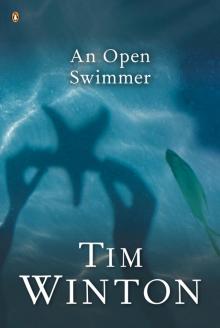 An Open Swimmer
An Open Swimmer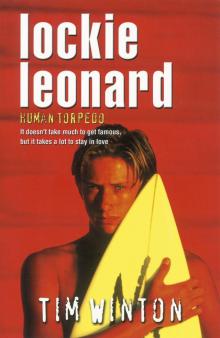 Human Torpedo
Human Torpedo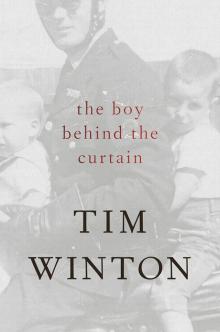 The Boy Behind the Curtain
The Boy Behind the Curtain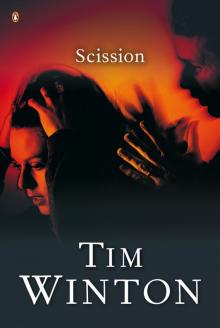 Scission
Scission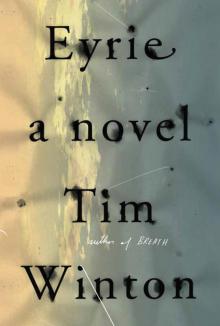 Eyrie
Eyrie Island Home
Island Home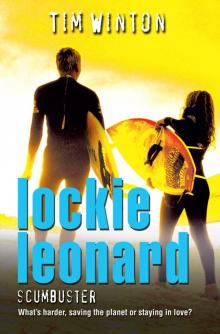 Scumbuster
Scumbuster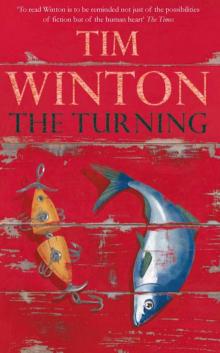 The Turning
The Turning Legend
Legend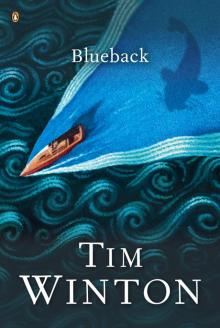 Blueback
Blueback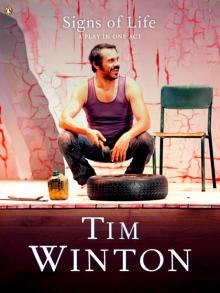 Signs of Life
Signs of Life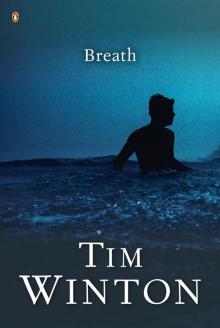 Breath
Breath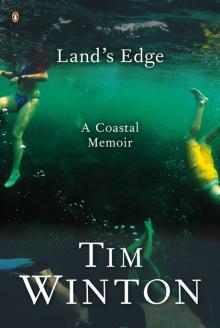 Land's Edge
Land's Edge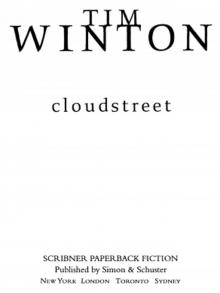 Cloudstreet
Cloudstreet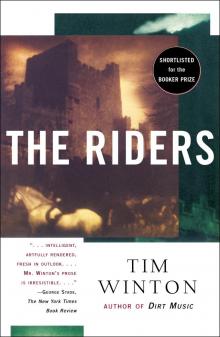 The Riders
The Riders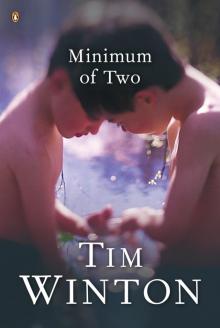 Minimum of Two
Minimum of Two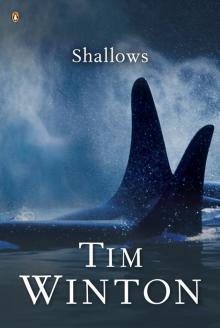 Shallows
Shallows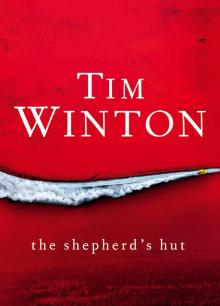 The Shepherd's Hut
The Shepherd's Hut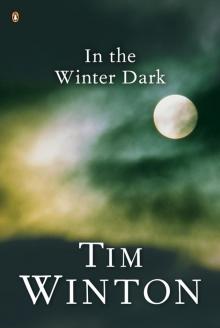 In the Winter Dark
In the Winter Dark